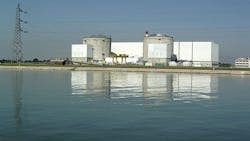From Nuclear Plant to Electric Car Factory? It Could Happen
PARIS - France's oldest nuclear power plant, scheduled for closure in 2018, could be turned into a factory producing electric cars or batteries, the French environment minister said Sunday.
Segolene Royal said Paris and Berlin had agreed during ministerial talks last week to work together to decide the future of the Fessenheim site, which lies on their shared border in northeastern France.
"What the Germans suggested was to work on developing the land to set up a Tesla factory or a factory for making third-generation batteries," Royal said in an interview with French media.
Tesla Motors, led by entrepreneur Elon Musk, this month launched a new model of its electric car aimed at the mass market, drawing some 325,000 orders in a week.
Last year the American automaker unveiled a domestic battery that allows people to run their homes from stored power taken from solar panels or from the electricity grid at night when it is typically cheaper.
A French-German working group will be set up to look at the two options as well as a third -- creating a pilot site for dismantling power plants, for which Royal said there was a "global market."
Royal is to meet Musk in the coming weeks to try to persuade the billionaire creator of Paypal to set up in Fessenheim.
Fessenheim houses two 900-megawatt reactors and has been running since 1977, making it France's oldest operating plant. Due to its age activists have long called for it to be permanently closed.
France and Germany are close EU partners but have taken vastly different energy paths. France gets more than 75% of electricity from nuclear plants and has been a leading international proponent of atomic energy.
Germany -- where the public mood swung against nuclear power following the 1986 Chernobyl disaster -- decided after Japan's Fukushima meltdown in 2011 to phase out nuclear power.
Copyright Agence France-Presse, 2016
About the Author
Agence France-Presse
Copyright Agence France-Presse, 2002-2025. AFP text, photos, graphics and logos shall not be reproduced, published, broadcast, rewritten for broadcast or publication or redistributed directly or indirectly in any medium. AFP shall not be held liable for any delays, inaccuracies, errors or omissions in any AFP content, or for any actions taken in consequence.
